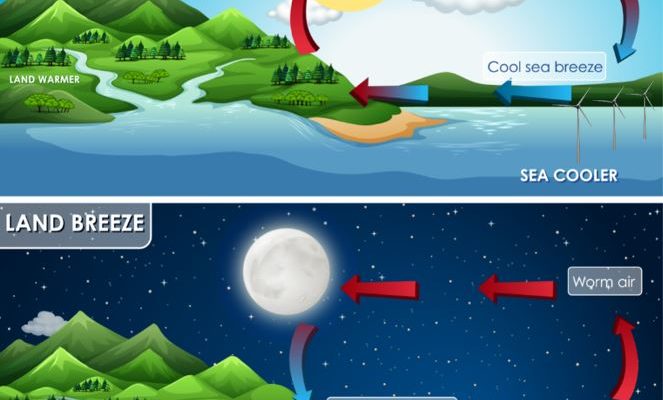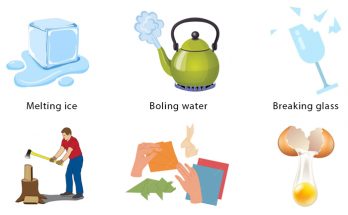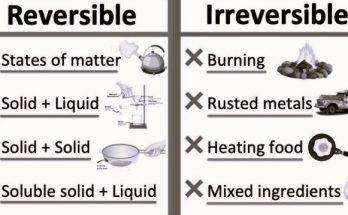Land breeze and sea breeze are significant phenomena observed primarily in coastal regions. They are governed by the principles of convection resulting from the differential heating and cooling rates of land and sea surfaces. A “land breeze” occurs at night when the land cools faster than the adjacent sea, causing the wind to blow from the land towards the sea. Conversely, a “sea breeze” occurs during the day when the land heats up faster than the sea, causing the wind to blow from the sea towards the land.
Table of Contents
Difference between Land breeze and Sea breeze in tabular format
| Feature | Sea Breeze | Land Breeze |
|---|---|---|
| Time of Occurrence | Daytime | Nighttime |
| Temperature of the Land | Land heats up faster than water | Land cools down faster than water |
| Air Pressure over the Land | Creates an area of low pressure over the land | Creates a higher pressure area over the land |
| Direction of Air Movement | From the sea towards the land | From the land towards the sea |
| Effect on Coastal Temperature | Brings cooler air from the sea, providing relief from heat | Carries heat away from the land, resulting in cooler temperatures |
| Role of Convection | Warm air over land rises, drawing in cooler air from the sea | Cooler, denser air from the land moves towards the warmer sea |
| Influence on Coastal Climates | Influences temperature variations and provides relief from heat | Influences temperature variations and provides relief from heat |
Also Check – Conduction, Convection, and Radiation
Difference between Land breeze and Sea breeze Explained in Details
Difference between Land breeze and Sea breeze in terms of Time of Occurrence
Sea Breeze
- Occurs during daylight hours.
- Initiated by the heating effect of the sun on the Earth’s surface.
Land Breeze
- Occurs during nighttime.
- Initiated as the land loses heat due to radiation after sunset.
Difference between Land breeze and Sea breeze in terms of Temperature Variation on Land and Sea
Sea Breeze
- Land surfaces absorb solar radiation more efficiently, causing them to heat up more quickly compared to the sea.
- This creates a temperature difference, with the land being warmer than the sea during the day.
Land Breeze
- Land surfaces lose heat more quickly due to radiation, cooling faster than the sea at night.
- The temperature of the land drops faster than the sea, creating a reverse temperature difference.
Difference between Land breeze and Sea breeze in terms of Air Pressure Variation
Sea Breeze
- Warm air rises over the land, creating a low-pressure area.
- The sea remains cooler, and a relatively higher pressure is maintained.
Land Breeze
- Cooler and denser air over the land creates a high-pressure zone.
- The sea maintains a relatively lower pressure due to slower cooling.
Difference between Land breeze and Sea breeze in terms of Air Movement
Sea Breeze
- Air moves from high to low pressure, meaning it flows from the sea to the land.
- This movement of cooler air from the sea helps to reduce the temperature over the land.
Also Check – The Highs and Lows of Air Pressure
Land Breeze
- Air moves from the land to the sea, from the high-pressure zone over the land to the low-pressure zone over the sea.
- This transports cooler air from the land across the sea.
Difference between Land breeze and Sea breeze in terms of Effect on Coastal Climate
Sea Breeze
- Results in a cooling effect along the coastlines and a bit inland.
- Helps in keeping the coastal areas cooler compared to areas further inland during the day.
Land Breeze
- Has a cooling effect during the night.
- Contributes to lower nighttime temperatures in coastal areas compared to the sea.
Difference between Land breeze and Sea breeze in terms of Role of Convection
Sea Breeze
- Convection circulations are set up due to the temperature differences between the land and sea, promoting upward movement of warmer air and horizontal influx of cooler air.
Land Breeze
- Convection circulations are weaker compared to sea breezes, with cooler air moving horizontally from land to sea.
Difference between Land breeze and Sea breeze in terms of Influence on Local Weather
Sea Breeze
- Often associated with the development of local weather phenomena such as sea breeze thunderstorms due to the lifting of warm moist air.
Land Breeze
- Generally leads to clear skies and calmer weather conditions due to the subsiding cold air.
Curious Queries – Land breeze and Sea breeze
Do land and sea breezes affect weather forecasting?
Answer- Yes, they can influence local weather patterns, especially in coastal areas, affecting weather forecasts.
Can land breezes and sea breezes affect sailing?
Answer- Absolutely! Sailors often use these breezes to navigate, especially when sailing near coastlines.
Why don’t land breezes and sea breezes happen in the middle of continents?
Answer- They occur primarily in coastal areas because they depend on the temperature difference between land and sea, which isn’t present in inland areas.
Can these breezes affect the temperature of the ocean?
Answer- They can slightly affect the surface temperature near the coast but generally have a minimal impact on overall ocean temperatures.
Do land breezes and sea breezes happen all year round?
Answer– These breezes are more common in certain seasons, depending on the region. They’re typically more pronounced during warmer months.
Can these breezes affect beach activities?
Answer- Yes, they can change beach conditions like temperature and wave patterns, affecting activities like swimming or beach sports.
Do animals or plants adapt to these breezes?
Answer- Some coastal plants and animals have adapted to the regular patterns of land and sea breezes for survival and growth.
Frequently Asked Questions
What causes a land breeze?
Answer- A land breeze happens at night when the land cools faster than the sea, creating a breeze from the land towards the sea.
What causes a sea breeze?
Answer- A sea breeze occurs during the day when the land heats up faster than the sea, causing a breeze from the sea towards the land.
Are land and sea breezes the same in intensity?
Answer- No, their intensity can vary based on factors like temperature differences and geographic location.Can land breezes and sea breezes affect air quality?
Answer- Yes, they can influence air quality by moving pollutants either away from or towards the coast.


